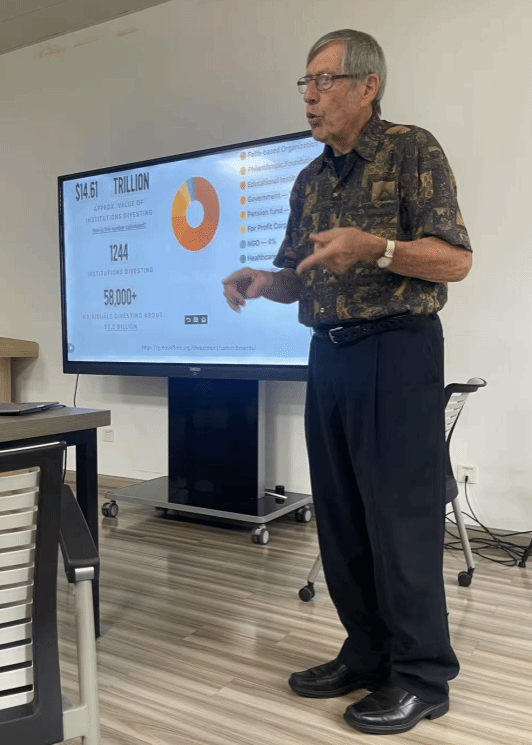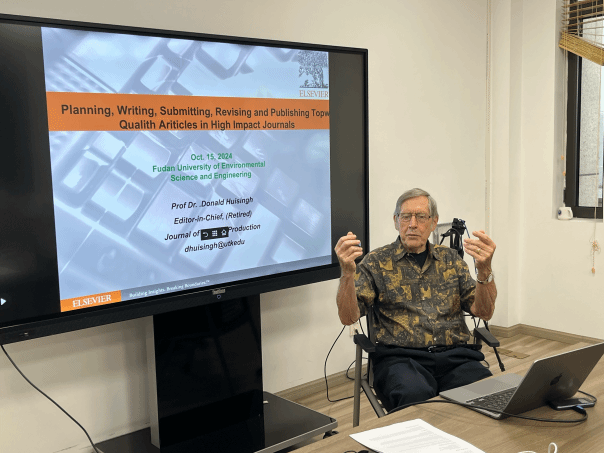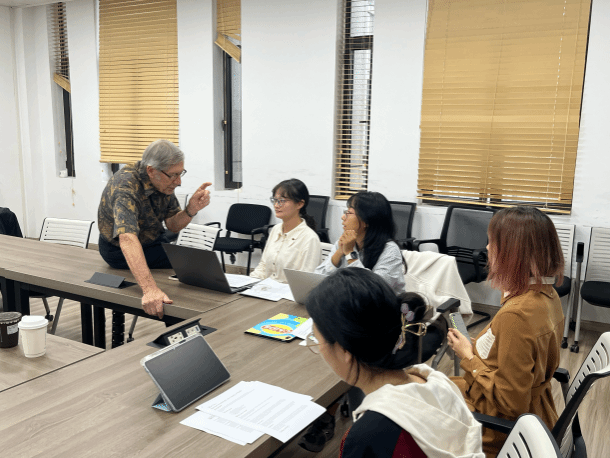2024年10月15日上午,复旦大学环境科学与工程系的王玉涛教授邀请了美国威斯康星-麦迪逊大学博士、田纳西大学教授、全球公认的清洁生产和可持续发展领域的专家Donald Huisingh教授,为我校师生进行了学术讲座。本次讲座是环境前沿讲堂可持续科学系列的第二场,并获得了复旦大学国合处“双一流”全球发展战略推进项目的支持。
On the morning of October 15, 2024, Professor Wang Yutao from the Department of Environmental Science and Engineering at Fudan University invited Professor Donald Huisingh, an internationally renowned scientist in the fields of clean production and sustainable development, from the University of Wisconsin-Madison and the University of Tennessee, to deliver an academic lecture for our faculty and students.This lecture, as the second session of the Sustainable Science Frontier series, was funded by the Global Development Strategy Promotion Project of Fudan University’s International Cooperation Office.

在题为《清洁生产、循环经济、生物模拟与可持续智能制造以及人类的挑战与机遇》的讲座中,Huisingh教授详细论述了“危机”的含义,指出其中既包含了危险,也充满了机遇。他分析了全球在气候变化、空气污染防治及自然资源利用等方面面临的重大挑战,并着重介绍了Donella Meadows的系统思考理论。为了推动可持续发展,他建议发展循环经济,尽可能在生产环节减少浪费和污染,同时使用可再生和清洁能源。 Huisingh教授通过一系列的视频和图表,生动地展示了生态环境恶化的现状,并以中国近年多个城市雾霾增加的实例,揭示了空气污染对人类健康的威胁。最后,他讲解了全球生态环境问题及其带来的社会问题,如气候变化、海平面上升、人口激增、粮食短缺、贫富差距、沙漠化、生物多样性减少等。Huisingh教授强调,在地球这个庞大的生态系统中,每个人、每个家庭、每个国家都承担着责任。
Professor Huisingh presented an academic lecture titled "Clean Production, Circular Economy, Biomimicry, and Sustainable Intelligent Manufacturing, Challenges and Opportunities for Humanity." He began by discussing the definition of "crisis," emphasizing that crises contain both dangers and opportunities. Professor Huisingh talked about the severe challenges facing the world today regarding global climate change, air pollution prevention, and the utilization of natural resources, focusing on Donella Meadows' systems thinking theory. He proposed the development of a circular economy to reduce waste and pollution from the production end, advocating for the use of renewable and clean energy to promote sustainable development. Furthermore, he vividly illustrated the deteriorating state of the ecological environment through a series of videos and charts, using examples from recent years where multiple cities in China experienced increased haze levels, highlighting the threats air pollution poses to human health and life. Finally, he introduced global ecological environmental issues and the related social problems they cause, including climate change, rising sea levels, population explosion, food shortages, significant wealth disparities, desertification, and loss of biodiversity. He emphasized that within the vast ecological system of our planet, every individual, every family, and every nation bears certain responsibilities.


报告结束后,Huisingh教授详尽指导研究生的论文写作,并与师生就可持续发展议题进行了深入的交流。Huisingh教授的演讲生动形象,获得了在场师生的热烈掌声。这场讲座不仅拓宽了师生的视野,也激励他们在面对“危机”时,以系统思维辩证看待问题,对从事相关研究的师生具有重要的指导和促进作用。
After the lecture, Professor Huisingh provided detailed guidance to graduate students on their thesis writing and engaged with faculty and students in deep discussions on sustainable-related topics. His engaging speech garnered warm applause from the attendees. This lecture not only broadened the perspectives of faculty and students but also inspired them to employ "systems" thinking when facing "crisis" issues, providing vital guidance and promotion for those involved in related research topics.


